Search results for 'co-parenting' (40)

When you get married, everyone has an idyllic picture of what their life will look like. Most people think of the dinners together, the sleepy Saturday mornings, and lots of sex. We all assume that the fights over money, housework, and whose turn it is to go rock the crying baby will never enter the threshold of OUR home. That happens to THOSE people. Who aren’t as madly in love as we are. And even if those disagreements did creep in, they’d be talked about in a mutually respectful manner where both sides feel seen and validated. And the makeup sex would be fierce. (insert uncontrollable giggling) That’s what everyone’s marriage looks like, right? There’s not the underlying tone in every argument of whose day was harder. Or who’s doing more of the work. Or whose mother is more intrusive. Marriage is HARD. Even the healthiest and strongest of marriages take lots of work. ALL the time. Because it’s one flawed human being who’s raising other flawed human beings with another flawed human being. It’s kind of a recipe for disaster if we aren’t always trying to better ourselves and our relationship. One of the biggest silent killers of a healthy relationship is resentment–where one partner feels they’re being treated unfairly by the other. And, believe me, when left untreated, it can create huge holes that you have to climb out of. That are much bigger than the original offense. Before we can get to the root in order to address it, we first have to even be aware that that’s how we’re feeling. It can often be really difficult to spot and can mask itself with a lot of other emotions–and we end up acting out of those emotions, none the wiser that it stemmed from resentment. Here’s a few signs you might be feeling resentful towards your partner: You experience negative thoughts on a regular, recurring basis about your partner. I’m not just talking about being annoyed because they didn’t take the trash out or loaded the dishwasher wrong. I’m referring to times when you’re really even having a hard time finding any positive qualities about them. Or when you’re brought back to that same thought about them, again and again. You keep replaying a conversation or situation between the two of you. Especially if it’s essentially been deemed resolved in your relationship, if you’re having a lot of trouble moving on, chances are, you feel like you didn’t get to speak your mind or weren’t clearly heard. And when this happens repeatedly, resentment grows. You find yourself not wanting to be close, physically or emotionally. Hugs used to be your love language, and now you don’t want to be touched. Normally, you really appreciate opening up to him in conversation, and now you’re avoiding it. You’re pulling away because you don’t like how it feels to be close. So what do you do if you’re feeling resentful towards your partner? The first step towards restoration is getting to the root of WHERE the resentment is coming from. Can you pinpoint a situation, discussion, or event where you first started feeling this way? This is so key in order to move forward because you can’t expect your partner to apologize or change things in the future if they don’t know (or you don’t know!) exactly what you’re upset about. Next, you’ve gotta give your partner and yourself lots of grace. People are going to mess this up. I’m not even talking about the actual injustice, necessarily. People mess up this part of making things better. Which can lead to more conflict! But when you can remember that, again, we’re all just flawed human beings doing our best, you’ll be able to move forward much quicker and are way more likely to be able to show some empathy, rather than holding it over their head for years to come. Lastly, have that hard conversation. As much as you can, try to use those tried and true “When you _, I feel _.” statements. Be as clear as you can without diving into the “you always” or “you never” games. And pick your timing for that conversation wisely. Right before bed or right after they get home is probably not going to give you the best shot for both of your minds being ready to tackle it. How can you prevent resentment from creeping in in the first place? The number one way to keep resentment at bay is open communication. (I know, your mind is blown that I just offered you this brand new, never heard of before piece of advice for relationships.) But there’s a reason why there’s hundreds and hundreds of books written about the topic: IT’S A BIG DEAL. When you let things fester, what would have been a simple conversation, turns into a huge argument. When your feelings are hurt, tell them. Don’t allow a miscommunication to create a divide in your marriage–one where other voices can easily work their way in. Keeping a relationship healthy year after year requires sacrifice and hard work. But doing preventative work like THIS can make it juuuuust that much easier. You've got this, mama! For help with intimacy and parenting in Partnership, download the Modern Mamas Club App to get access to the Parenting in Partnership Daily Dose Guided Lessons so you and your partner can get back on track and enjoy each other again.

Dr. Whitney chats with Alexandra Scherzer, parenting guide and Co-Founder of Wise Parenting, about how parents can raise their kids from a different perspective. They discuss new-parent overwhelm as well as what it looks like to parent based on who your child is and what your parenting abilities are.

Let me be clear, I hate the back to school avalanche of papers that have to be filled out. Like HATE, hate. I hate that we have to fill out the same information on a bunch of different forms. I hate that I know some of these will be looked at once and tossed. I hate that it’s someone’s job to put these forms into a computer when we could have just done it in the first place and saved both of us time. I hate it. And for years, I filled them all out every back-to-school season by myself and I was miserable every second of it (and yeah, I know I could “choose joy” in the moment, but I did not, in fact, choose joy 😀) It wasn’t until I had a very honest conversation with my husband Scott that things changed. Moms are FAMOUS for becoming martyrs in our families. Except no one in our family has any idea. In our head, we’re like, “NO ONE cares that our house is dirty. I’m the only one who even pays attention to the filth.” But on the outside, we don’t ask for help or try to delegate. We just rage clean. On the inside, we’re like, “I hate cooking every night. I actually don’t like cooking at all!” but on the outside, we just keep plugging along pulling things out of the freezer at 5pm and no one is the wiser that you’re dying inside. I know everyone’s situation is different. I really do. But I firmly believe that if you’re parenting your kids with some sort of partner (anything really, across the board), you HAVE to be splitting up responsibilities equitably. Or at least so that both partners feel things are equitable. That doesn’t mean you’ll have an exactly equal amount of tasks or split down the middle on how long it will take. But in order to have a respectful relationship, one parent cannot be the default parent when it comes to responsibilities pertaining to your kids. And this is especially true for moms who become the she-fault parent (see what I did there) for all things back-to-school. I mean, it’s kinda ingrained in us right? How often do we hear things like “room mom” at school or “snack mom” at practice? It never goes the other way. Society assumes that moms will just do it all because we’ve LITERALLY ALWAYS JUST DONE IT ALL. And moms are burnt out and overwhelmed. Here’s what you can do to make sure that you’re not taking on all the of the back-to-school brunt: Have that conversation. I can’t tell you how many times I’ve told Scott something was bugging me and he would tell me he had no idea it was even happening. Often, something that is a really big deal to us just isn’t on their radars. And, as much as we would like them to be, they simply aren’t mind readers. Be clear and kind, letting them know how you’re feeling and what you propose could be different. Try to focus on what you’d like to see changed rather than on what “always” or “never” do (in fact, just don’t say those two words. It never goes well.) Split things up in a way that actually makes sense. Stop assuming you’ll make all the lunches because you make all the rest of the food in the house. Does your husband work from home? He probably has less to do to get ready in the morning and has extra time so that task can be his. If you drive right past Target everyday on your way home from work, you can be the one to do the drive up order. Take a look at what has to be done and divide it up so that none of you actually hate what you’ve got on your task list. For stuff you both dread, do it together. I talked about this a couple weeks ago, but if you can split that mile high pile of papers that comes home on the first week of school, you’ll get them filled out way faster (that’s how math works). And it’s muuuuch more fun to do it sharing a glass of wine or with a movie on than by yourself crying in the bathroom because your hand keeps cramping up. Bottom line: speak up and don’t let yourself take on ALL the things (plus all the guilt that comes along with not being able to do them all well) simply because that’s how it’s always been.

I just saw a meme the other day that was a cartoon of a mom sitting in a hospital, bandaged and casted from head to toe, sitting in a wheelchair. The caption underneath read, “My kids would still ask me for snacks.” I laughed so hard because it could not be truer. I’ve had a kiddo walk past their dad on the couch to come find me in the shower to ask me to open their water bottle. I honestly cannot explain this phenomenon, but I’ve never met a family where they don’t say the same thing is true in their house. In 99.9% of families, mom is the “Chief Question Answerer.” And these questions run the gamut. Everything from, “Mom, can I watch a show?” to “Mom, can you sign this permission slip?” to “Mom, what happens when we die?” In the moment, it might seem that answering a little question isn't a big deal, but I just read an article that said moms get asked almost 400 questions a day. FOUR HUNDRED. No wonder we’re all exhausted. Decision fatigue is a real thing! Plus you have to add all the other things on top of that that we’re deciding on throughout the day. What should we have for dinner? What preschool should we put our kid in? When can I go visit my sister? What should we get the cousins for Christmas? All the things. When we become the Chief Question Answerer as well as the Chief Figure Outer in our homes, there’s a couple things that happen. First, like I mentioned, we get worn down. After you’ve already answered 285 questions at dinner, deciding whether or not your kid can go to the park seems like they’ve just asked you to solve a quadratic equation. And a worn out mom can easily become an angry mom. A distracted mom. A disconnected mom. The second thing that happens is that we can get resentful towards our spouse. Even being the person who has to say yes or no to snacks ALL the time can feel like you’re the gatekeeper. Like you’re the only one who has to say no. And that can easily make you feel like your spouse isn’t contributing. Even over something as silly as snacks. When in reality, most of the time, they just aren’t being asked the things. More than likely, they’d be happy to open the popsicles or to help with homework. But, at least in our house, our kids have gotten into the habit of coming to me for everything. Even though their dad is perfectly capable of doing it all. And is probably right in front of their faces. So how do we divide things up so that we both feel good about our share of the emotional decision making? First, we’ve gotta break the habit from our kids. They don’t know they’re doing it and they’re certainly not ignoring their dad’s perfectly skilled fruit-snack-opening fingers on purpose. Just like we’ve divided up time in our home where one parent will get up early with the kids while the other kind of tucks away for some alone time, we can do the same things with this. Maybe you divide up the days based on who’s making dinner. If it’s dad’s night, then mom fields all the questions and vice versa (and yes, that does mean dads can have nights cooking dinner!) If that doesn’t seem like it would flow in your house, try a different way to divide it. However you decide, make sure it’s known to your kids and your spouse. “For the next two hours, all requests go to dad.” And then don’t give in. This is a great opportunity to give your spouse a chance to see just how many things are requested of you all day long. The second thing we can do to help redistribute the weight of this is to get better at asking for help and expressing our needs. For a long time, every Christmas my husband would say to me, “Thanks for handling everything this year.” And that would enrage me. I’d think, “Well if I didn’t handle it all, nothing would get done!” Once I realized that I wasn’t even TRYING to hand off things to him, it all got simpler. I made a list of the 497 things I had to do around the holidays and told him the top 5 things that stressed me the most. I asked him to pick 3 of them and let him know that I would be SO much more relaxed if he could handle those. And you know what? He did them! Not exactly how I would have done them, but it was so much better than me running around trying to fit it all in while still working full-time. Moms are reeeeally good at becoming martyrs for things they could have just asked for help with. ASK FOR HELP. And not just with the things that seem like they need to get checked off your list. Because sometimes we do need help with carpool and making the snacks and doing the laundry. But sometimes we also just need someone to decide for us if we should cook chicken or fish. Because it doesn’t matter if it’s deciding something that could greatly affect your family or just something inconsequential, you deserve to do it within community.

Let me paint a picture for you: You walk in the house after a reeeeally long day from work, exhausted. On your way home, you picked up the kids from the sitter and your husband’s dry cleaning. In the car, you already practiced spelling words with your oldest and counseled your youngest through kindergarten friend drama. Now that you’re home, you get them started on their homework and go to sit on the couch. That’s when you take in the wreckage that has become your house as the kids got ready for school this morning. How is it possible for four humans to make such a mess in a house that they spend so little time in? Your partner walks through the door and says, “Sorry I’m late. Some of the guys from the office went out for a beer after work. What’s for dinner?” Do you: A) calmly point to the chart you made on the wall that says it’s actually his night to make dinner B) tell him that you’re not his mom and if he wants something in particular he can make it himself c) fly into a blind rage and smother him with a pillow If I’m honest, I used to be a LOT more B and C and not so much any A. What about you? Do any of those sound familiar? Maybe you, like I was, are a chronic take-everything-on-yourselfer. As moms, there’s a LOT on our shoulders. Some of it was put there by society but some of it’s there simply because we haven’t asked anyone else to take it. And that’s what I wanna chat about for the next few weeks: why are moms shouldering SO much of the parental load, what happens in us and in our families when we feel the effects of it, and what we should do about it. Moms who are taking on a disproportionate amount of responsibility in their homes and in their families end up feeling a lot of the same things: resentment, high anxiety, like they could flip their lid with their husband or kids at just about any moment, angry aaaalll the time. We basically feel stretched way too thin and mad that no one else sees that. Over the next few weeks we’re going to talk about ways we can help alleviate some of that by getting our kids and partners involved and by automating as much as we can in our lives. But before all of that, we have to take a look at WHY we’re in this mess. Why have we allowed ourselves to dig this hole (or be put into it?) and are so afraid to ask for help getting out of it? I think it’s for a couple of reasons: one, we’re afraid of looking like we can’t do it all…which we can’t–at least not well! But we don’t want anyone to see underneath this facade of looking like we can do it all. So we don’t ask for help from our kids or partners, and CERTAINLY not from any other moms. Because then the jig would be up and they’d be in on our little secret. I think we’re also afraid of letting go of control . What would happen if we didn’t take care of all the things? Maybe you’ve seen the evidence of what happens when you ask your husband to grocery shop for you. Or ask your kids to clean their bathroom. I pushed against it for SO long because I knew it was gonna be a long time before all of those things were either done “my” way or until I was mature enough to just not care about it. When we choose to put ourselves on mom-island all by ourselves, we convince ourselves it’s the only way to do it. The only way things will actually get done, that your kids will go to school with clean, matching clothes, and that you won’t have to run around fixing all the fires. But what you’re doing now isn’t any better. You’re constantly feeling pulled in a million directions, trying to do it all, and feeling undervalued for the weight that you’re carrying. —And of course we know there’s societal pressures and biases out there. As much as we’d like to be strong feminist women, sometimes we find ourselves just falling into typical gender roles without much thought. Or listening to the pressures and biases of society that tell us if our house isn’t perfectly cleaned, our kids aren’t perfectly behaved, and we don’t have home-cooked meals on the table every night (cooked by us, obviously) that we are doing something wrong as women and as moms. What I want you to know is that it doesn’t have to be this way. It can feel waaaaay easier to get things done and still have free time. To have less guilt about dropping balls. To show up as the mom you want to be. We talk a lot about this in the Modern Mamas Club app. Like a loooot a lot. Head over here to check it out!

When our child demands “I want Mommy to put me to bed tonight,” after we just had the day from hell, still have piles of laundry to fold, a sink filled to the brim to clean, a dishwasher to unload, 10+ work emails to send and, oh a shower to take at least once this week, it officially becomes too much to handle.

Hardly anyone expects to have a hard time with their partner after a baby comes along but, the reality is, most couples struggle. New York Times bestselling author Jancee Dunn tells it like it is in this episode and gives real, sound advice on how to make it better. Jancee was a staff writer at Rolling Stone for over a decade, and a veejay at MTV for five years. She writes for many publications, among them the New York Times, Vogue, Travel and Leisure, Food & Wine, and Parents, and was a columnist for GQ and O, The Oprah Magazine. Visit Jancee’s Website: Jancee Dunn Follow Jancee on social: Instagram Read Jancee’s book: How Not to Hate Your Husband After Kids

It’s hard to believe that we’re passed the one-year mark since the onset of the pandemic that catapulted us into an entirely new way of life and challenged nearly everything we once considered as “normal.” We moms, dads, and caregivers felt the ramifications and the weight of all of these changes perhaps more than anyone else, as we struggled to coordinate childcare, hold steady to our jobs and grapple with this new, anxiety-inducing way of life.

Talk to a handful of C-suite executives, and you’ll begin to see a pattern to their success. There’s hard work, yes. And there’s drive. But there’s also the ability to delegate. Sharing the burden of any major level of responsibility (and what job can rival modern parenting in that category?) is key to finding balance, joy, and even purpose. It’s time, in other words, to delegate like a mom.

I’ll be honest, it took me a LONG time to recognize when I was treating my husband with a “I’m the boss and you’re the employee” mentality—but what I do know is that it’s NOT helpful! It’s okay for you to show your partner how you want things done, but Mama, you also need to learn to let go of the little things that really don’t matter all that much.

When you have a high-needs child – a little one with developmental, physical, or behavioral challenges like anxiety or ADHD – understanding how to help him or her thrive can feel like a full-time job. This week on the podcast, Dr. Whitney gets personal about how to take care of your kid (and yourself), especially during uncertain times. We're thrilled to announce three new online programs coming to Modern Mommy Doc at the end of September!



















